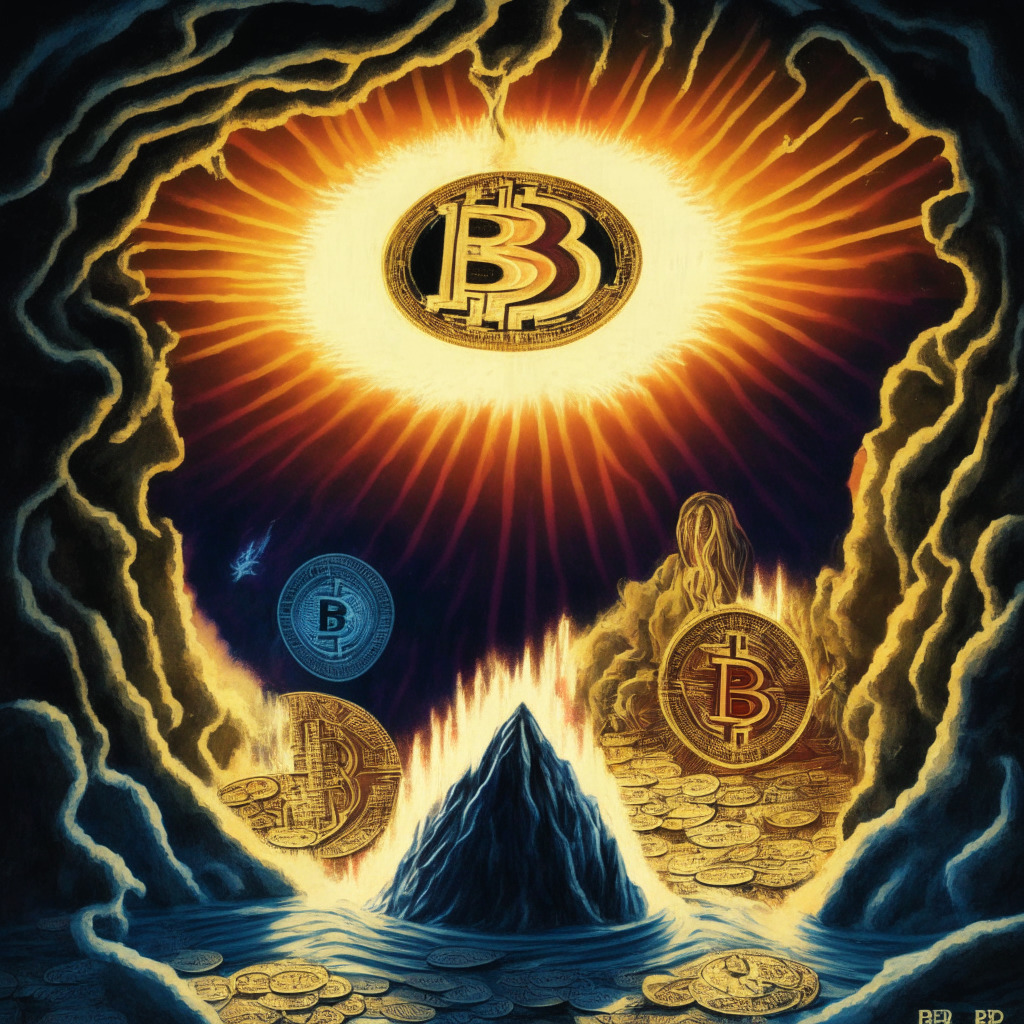Ribbon Finance’s decentralized exchange Aevo introduced options trading for alternative cryptocurrencies, allowing users to execute complex trading strategies and access instant quotes from crypto market makers. Aevo’s portfolio margin system enhances capital efficiency and offers valuable opportunity for traders focusing on smaller market cap tokens.
Search Results for: Flex Coin
Meme Coins Surge on Indian Crypto Exchange: Growing Trend or Passing Fad?
India’s top cryptocurrency exchange, Unocoin, recently listed meme coins FLOKI and PEPE, offering users more diverse investment options. However, the long-term sustainability of meme coins remains questionable, as their popularity relies heavily on social media hype, possibly creating a bubble that could burst and impact smaller investors.
US Inflation Decline: A Boon or Bane for Bitcoin and Cryptocurrency Markets?
The U.S. inflation decline and anticipated pause in June’s rate hike could increase investor interest in cryptocurrencies like Bitcoin. However, high core CPI and potential BTC volatility due to reduced liquidity must be considered by investors.
Bitcoin-Gold Hybrid Derivatives: A New Horizon for Stability Amid Economic Uncertainty
Orbit Markets partners with PI Digital to introduce the first bitcoin and gold hybrid derivative product, aiming to provide investors exposure to both gold and digital assets during macroeconomic uncertainty. This innovative product offers flexibility and showcases the promising future of finance.
Binance Boosts PEPE and FLOKI Memecoins: Excitement, Growth, and Market Volatility
Binance recently announced new functionalities for memecoins PEPE and FLOKI, generating enthusiasm among crypto enthusiasts. The addition of Binance Convert allows users to switch between tokens with zero fees, increasing usability, flexibility, and market value, while potentially attracting more investors to the crypto market.
Bitcoin Network Congestion: Sign of Growth or Scalability Crisis?
The Bitcoin network experienced heavy congestion on May 7, with the BTC mempool swelling to over 400,000 transactions awaiting confirmation. This raises concerns about the scalability of the Bitcoin blockchain and highlights the need for continued development and innovation to accommodate growing demand and ensure long-term usability.
Surge in Bitcoin Transaction Fees: Temporary Anomaly or Lasting Trend?
The Bitcoin network’s transaction activity surge, driven by Ethereum-style BRC-20 tokens and NFT-like “inscriptions,” has led to increased congestion and a spike in transaction fees, reaching $7.25 on Wednesday. While some experts anticipate temporary fee inflation, others expect a lasting trend due to NFTs’ growing popularity.
Federal Funds Rate Hike Pause: A Boon for Bitcoin and Crypto Market Resilience
The end of rate hikes is noteworthy for the crypto market, with this week’s hike being good news for BTC and other crypto assets. An extended pause in rate hikes usually leads to more liquidity, making “risk assets” like bitcoin more attractive. Moreover, bitcoin’s rising value influences the broader crypto market, attracting attention, sparking business growth, and investments in market infrastructure and crypto asset services.
The Crypto Rollercoaster: Market Fluctuations, Emerging Cryptos, and Retina Scans in Play
The cryptocurrency market is currently experiencing a minor descent, anticipating the Federal Reserve’s interest rate announcement. Sam Altman’s new Worldcoin employs retina scans to counteract AI-developed synthetic identities. Despite the market’s decline, Flex Coin, Evil Pepe Coin, ApeCoin, Burn Kenny, and The Graph highlight their strong potential due to robust fundamentals and positive technical analysis.
Nasdaq’s Withdrawal Shakes the Crypto World: Premising Contenders Emerging Stronger
“Nasdaq’s proposed cryptocurrency custody service has been put on hold due to regulatory ambiguity. The absence of a credible custodian like Nasdaq may impact smaller entities aiming to offer their own services. Meanwhile, cryptocurrencies like Flex Coin, Evil Pepe Coin, Stellar, Burn Kenny, and Cardano show promising signs despite potential risks inherent in a volatile market.”
Navigating the Volatility: Promising Crypto Opportunities Amid Market Fluctuations
“In recent cryptocurrency market activity, Bitcoin faces resistance around the $30,000 mark. Certain cryptocurrencies like Flex Coin, Evil Pepe Coin, Chainlink, BTC20, and Sui are noted as potentially profitable investments due to solid fundamentals and promising technical analysis. However, the volatile market brings both opportunities and risks, underscoring the need for vigilance and strategic decision-making.”
Hong Kong’s Leap into Crypto Landscape: A Regulated Paradise or a Volatile Nightmare?
Hong Kong grants a retail trading license to the HashKey platform, reflecting its readiness to become a crypto hub in Asia. The move expands digital assets access to retail investors. Notably, auditing firms KPMG and EY will ensure operational transparency, underlining Hong Kong’s focus on secure crypto regulations.
Coercing Cyber Criminals: The Dilemma of Crypto Bounty for Stolen Assets Recovery
“In the evolving blockchain technology landscape, securing crypto platforms against cyber breaches remains a pressing task. Instances like HTX using bounties to recover stolen funds hint at innovative strategies, but also present a dangerous precedent. Persistent advancements in blockchain security are therefore essential.”
Balancing Act: Supervising AI Vs. Regulating Cryptocurrencies – Who Gets the Upper Hand?
This article discusses a project launched by UNESCO and the Dutch government to study AI supervision across Europe, aiming to develop guidelines from best practices. It also highlights the contrast of some nations focusing heavily on AI regulations, while cryptocurrency protocols, such as for stablecoin transactions, are being neglected. The importance is stressed of striking a balance between embracing technological advances and ensuring proper regulation for consumer protection.
Pivotal Move: How the UK’s Regulatory Changes Could Shape the Global Crypto Landscape
“The United Kingdom could potentially leapfrog the US in Web3 crypto environments, contingent on an unconventional regulatory trajectory. Changes like curbing liabilities for DAO token holders and amending FCA’s KYC guidelines could catalyze growth in emerging technologies. Nonetheless, the crypto evolution is challenged by potential misuse and regulatory hurdles.”
European Crypto Regulation: Balancing Sustainability, Transparency and Freedom
The European Securities and Markets Authority (ESMA) has published its second consultation paper on cryptocurrency regulations, focusing on sustainable indicators for distributed ledgers, disclosure of insider information, technicalities within white papers, transparency measures and record-keeping for Crypto asset service providers. ESMA’s move aims to encourage a more sustainable, transparent, and accountable crypto-market.
El Salvador’s Volcano Energy: Disrupting Crypto Mining with Renewable Power and Risking It All
El Salvador partners with Luxor Technology, with support from Tether, for its first renewable energy Bitcoin mining operation through Volcano Energy. This ambitious billion-dollar project aims to make El Salvador a powerhouse in renewable energy and Bitcoin mining. However, inherent challenges and critics question the appropriateness of using renewable energies for crypto mining.
Unpacking Project Atlas: A Centralized Perspective on Decentralized Markets
‘Project Atlas’, pioneered by Bank of International Settlements and various European Central banks, is developing a proof of concept system tracking on-chain and off-chain cryptocurrency transactions. The project aims to understand macroeconomic relevance of cryptocurrency markets and decentralized finance, offering transparency and potential risk mitigation.
VanEck’s Ethereum Strategy Fund: A Promising Paradigm or Risky Experiment?
VanEck’s Ethereum Strategy Fund (EFUT), set to be listed on the Chicago Board Options Exchange, offers fully-standardized, cash-settled futures contracts. With approval from the Securities and Exchange Commission, these contracts provide exposure to futures without requiring direct exposure to the actual digital asset. This move illustrates the growing trend of crypto-based futures tailored for mainstream investors.
Unveiling the Crypto Crisis: The Rising Wave of Blockchain Cybersecurity Breaches in Q3 2023
The alarming increase in cybersecurity breaches in the blockchain resulted in a loss of over $685 million in the third quarter of 2023. This number rose by 59.9% from the previous quarter’s losses. With notable incidents spanning across 49 protocols and projects, these cybercrimes misappropriated almost $662 million. The vulnerability of the DeFi sub-sector has been specifically highlighted, as it lost a massive $2.8 billion in 2022.
PayPal’s NFT Venture: A Bold Leap into Blockchain or a Risk to Decentralization?
“PayPal’s recent patent application for a non-fungible token (NFT) purchase and transfer system boldy underscores the mainstream acceptance of blockchain technology. The filing suggests designs to leverage NFTs for tokenization, far beyond digital collectibles. However, it also proposes off-chain transactions potentially diverging from the philosophy of complete decentralization that attracted enthusiasts to blockchain technology.”
Huge Debates Arising Over Validator Commissions and Infrastructure Provider Funding in Terra Classic Community
The Terra Classic community debates two critical proposals: correcting an unintentional 0% validators’ commission rate, which current votes lean towards rejection, and the recognition and financial support for top-tier infrastructure provider, Allnodes which also currently faces rejection. Concurrently, BTCMTX offers an innovative Stake-to-Mine model making Bitcoin mining accessible.
Meta AI vs OpenAI’s ChatGPT: The Dawn of a New Social Media Interaction Era and Its Ramifications
“Mark Zuckerberg sets to launch Meta AI, interacting across platforms like Instagram and Facebook. Aiming to outdo OpenAI’s ChatGPT, Meta tailors AI products to distinct use cases and entertainment, scheduled to release to selected U.S users and integrate with upcoming smart glasses.”
Taiwan’s Firm Stance toward VASPs: Stricter Crypto Regulation versus Industry Growth Potential
Taiwan’s Financial Supervisory Commission (FSC) is implementing new regulations to improve safeguards for crypto investors. These regulations seek to control virtual asset service providers (VASPs) like Binance, Kraken, and ByBit, emphasizing asset safety, self-regulation, and legal operation in Taiwan. This overhaul coincides with local exchanges forming a regulatory body, and precedes FSC’s expected 2023 takeover as Taiwan’s primary crypto regulator.
Cry for Crypto Regulation: Ex-SEC Official Urges for Greater DOJ Involvement
Former SEC official John Reed Stark argues that the SEC’s current capabilities are insufficient to handle the growing, flexible crypto sector. Stark believes that the Department of Justice’s involvement is indispensable to impose penal measures as the SEC’s mandate restricts it to civil enforcement.
Deciphering the Unprecedented Alliance of Swarm and Wrapped.com in the DeFi Universe
The partnership between Wrapped.com and Swarm simplifies the conversion process across different blockchain networks, bridging industry divides. This collaboration infuses cross-chain technology with a custody-based solution, significantly influencing DeFi markets and rendering cross-chain crypto partnerships accessible to a broader audience. This may attract more institutional investments, marking a significant step in shaping the blockchain future.
Latency in Cryptocurrency Trading: A Barrier or a Competitive Edge?
“Latency in cryptocurrency trading significantly impacts the speed and flexibility of trades. Though achieving low latency can be challenging and costly due to investments in high-performance tech and regulatory compliance, its benefits in trade efficiency and competitiveness in the volatile crypto market are noteworthy.”
China’s Central Bank Stakes Digital Yuan’s Global Appeal: A Revolutionary Step or a Risky Leap?
China’s central bank has updated its official CBDC app to allow overseas visitors to purchase digital yuan tokens with foreign credit cards. The update reflects an unprecedented convenience, aiming to push the usage of mobile wallets of the CBDC, providing users with seamless online experiences, including refunds for any unused funds. This move widens the application of e-CNY, promoting its use for online financial exchanges on major platforms.
Unveiling Consensys Fellowship Program: Catalyst for Web3 Startups or Impractical Venture?
Blockchain leader Consensys introduces its first Consensys Fellowship Program, aiming to support Web3 startups. The non-equity program offers potential investments of up to $1.5 million, hands-on workshops, mentorship from industry professionals, and flexible part-time structure. It encourages innovative Ethereum use cases and startup growth.
Crypto Readiness Score: Analyzing World’s Crypto Hotspots and the Quest for Top Ranks
“Hong Kong retains its position as the most crypto-ready destination with a Cryptocurrency Readiness Score (CRS) of 8.36. Other notable players include Switzerland and the USA. India, emerging as the second-largest crypto market, highlights the dynamic and promising future of crypto technology.”
Trading Showdown: Forex vs Cryptocurrency – Stability or Innovation?
“Traditional forex trading involves trading fiat currency pairings, driven by worldwide financial hubs. Contrarily, cryptocurrency trading pertains to buying and selling digital currencies through exchanges, which introduces high volatility. Each market has unique advantages, risks, analysis methods, and strategies providing diverse opportunities.”
Navigating the Crypto-Conservatism: Binance’s Challenges in Global Regulatory Waters
“The crypto sphere is witnessing different regulatory responses worldwide. Singapore is taking a more conservative approach following the downfall of FTX exchange. Meanwhile, Hong Kong’s recent crypto regulations limit token availability for retail investors, however, advancements are being made with new financial institutions entering the crypto realm.”































